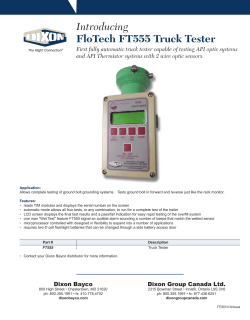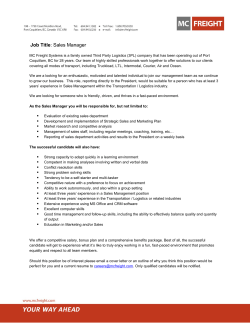
New directions in Duisburg Integrated Truck Guidance
New directions in Duisburg The world’s largest inland port is situated in Duisburg. As the leading logistics hub in Central Europe, the port serves as a pivotal point for all freight transportation originating in and destined for Central Europe. The management company duisport, has reported increasing handling volumes for years and is gearing up for additional growth – together with Siemens. While duisport specializes in port and logistics concepts, Siemens supplements that expertise with know-how in the field of automation technology and digitalization and is also a supplier of proven hardware. Siemens AG Mobility Division Otto-Hahn-Ring 6 81739 Munich www.siemens.com/mobility Duisburger Hafen AG Alte Ruhrorter Strasse 42–52 47119 Duisburg www.duisport.com Unused capacities Open road for trucks duisport recognized at an early stage that a comprehensive solution to control the truck traffic in and around the port would be key to continued competitiveness. As part of a pilot project, duisport worked with Siemens to develop an intelligent flow control system that makes the current traffic situation and the flow of freight traffic transparent to all involved parties. This system reduces unproductive work processes at loading ramps and terminals, helps to minimize congestion, waiting and travel times, and provides for a better overall utilization of existing resources. The intelligent truck guidance system will be implemented step by step. The system collects all truck data, anonymizes and bundles them with available traffic data such as travel time, traffic situation and congestions before forwarding it to mobile devices and LED signs. Arriving truck drivers receive all relevant traffic information as they approach and are quickly routed to the next available loading area or terminal in a coordinated fashion. © Siemens AG / Duisburger Hafen AG, 2015 All rights reserved. Printed in Germany hl 15029851 WS 04151.0 Dispo 22300 Order No. MOMM-B10003-00-7600 Integrated Truck Guidance Intelligent flow control for inland ports, seaports, and airports as well as for freight distribution centers The information in this document contains general descriptions of the technical options available, which do not always have to be present in individual cases. The required features should therefore be specified in each individual case at the time of closing the contract. The flow of goods is increasing worldwide, and transport hubs such as ports, airports, and freight terminals are facing tremendous challenges as a result. Not only does the performance of the hubs themselves have to keep pace with growing trade volumes, but it is also crucial to ensure their acces sibility. Yet the capacities of traffic routes in the hinterland are already confined and expansion is possible only to a limited extent. For these reasons, operators need to use existing infrastructures more efficiently. Everything flows smoothly One important lever to increase the efficiency at logis tics hubs is the faster handling of trucks. There is huge potential here as unnecessary waiting times with long traffic jams during peak times can be avoided. Comprehensive transparency regarding the current traffic situation in and around the hubs eliminates bottlenecks. Get to know an intelligent system that generates new capacities. A complete overview More freedom for everyone Truck drivers use a smartphone app to log into the system. GPS is used to determine their positions. Drivers, logistics providers, and terminal operators know at a glance whether the planned and estimated times of arrival match up. If they do, the driver can continue his planned route. Everyone knows what is going on, and everything flows smoothly. Thanks to this intelligent flow control system, it will be possible to create even more efficient logistics processes in the future. In addition, efforts will continue to further facilitate the integration of IT systems as a means of improving the traffic flow. For truck drivers. For shipping agents. For logistics providers. For hub operators. To ensure everything flows smoothly. Not just today, but tomorrow. If delays occur, the logistics provider and terminal operator are informed and can make new arrangements. At the same time, the truck driver is given the next possible slot. This helps to avoid congestion and reduce waiting times. If a new slot is not immediately available – resulting in a delay – the app automatically informs the driver about available parking spaces. The driver is assigned a new destination slot and can continue on. Traffic control system Control level Central level Field level Client Web Portal App Integrated Truck Guidance: Optimization and harmonization of the multimodal transport hubs of the future. Consulting & Design Realization Operation & Service Comprehensive support regarding design and implementation of customized transport and logistics solutions – ranging from consulting and utilization to services. IT-based flow control Integrated Truck Guidance Login Traffic control center ANPR cameras Floating cars* External systems The benefits LED signs *optional For truck drivers: decreased waiting times and travel times, less congestion, faster handling, less stressful driving and resting times Keeping information flowing For shipping agents: more trips per day, better utilization of vehicles, decreased fuel consumption, compliance with handling, dispatching and accounting Cameras are set up at defined points and detect travel times. The collected information is anonymized and forwarded to the central level via standardized interfaces. All information is collected at the central level, where the Siemens software Sitraffic® Concert is implemented as Application Service Providing (ASP). This means that the necessary systems do not have to be installed on a company’s own computers. Access is ensured via a highly secure Internet connection. The processed traffic data is transferred back to the truck drivers via a smartphone app and dynamic LED displays. Information regarding the traffic situation and travel times is made available to shipping agents and terminals via the Sitraffic smartGuard web portal. For logistics providers: decreased waiting times, greater utilization of loading ramps, increased throughput and performance, more efficient resource planning For hub operators: improved pollutant balance and local traffic flows, increased quality of existing infrastructure and general traffic safety
© Copyright 2025









